 BU’s International Centre for Tourism and Hospitality Research (ICTHR) is delighted to be hosting the second global conference to explore real-world issues.
BU’s International Centre for Tourism and Hospitality Research (ICTHR) is delighted to be hosting the second global conference to explore real-world issues.
The international conference: ‘Tourism, Climate Change and Sustainability’ will take place from 13-14 September 2012. The emphasis of the event is to discuss and disseminate conceptual ideas and contested relationships between climate change, sustainability and tourism and examine worldwide responses and exchange cutting-edge research.
Dr Maharaj Vijay Reddy and Dr Keith Wilkes are the organisers of this conference, who are also editing a book jointly on this title for Earthscan London. The book launch will also take place during the conference next year.
This conference will feature keynote presentations from high-level policy makers from international agencies UNWTO and UNESCO MAB, the European Commission, leading research institutions and the private sector. Among these distinguished speakers are:
- Mr Luigi Cabrini, Director UNWTO Sustainable Tourism, Madrid.
- Dr Ishwaran Natarajan, Director UNESCO Division for Earth & Ecological Sciences, Paris.
- Dr Richard Butler, Emeritus Professor, University of Strathclyde, Glasgow.
- Dr Stephan Harrison, University of Exeter & Oxford University Centre for the Environment.
Breakout sessions are planned to enable speakers to interact on a more personal level with delegates as well as for attendees to present their research on these important topics. In addition, leading publishers will be present throughout the duration of the conference to meet with delegates and discuss future publishing opportunities.
Dr Maharaj Vijay Reddy commented “we are pleased to announce this event on a globally crucial title. It will facilitate cutting-edge debates, timely knowledge exchange and networking”.
Dr Keith Wilkes says hosting the second ‘Tourism, Climate Change and Sustainability’ conference is “very exciting and, coupled with the high-calibre keynote speakers, is further evidence of the position of BU as a driving force at the forefront of global tourism research, teaching and professional practice”.
The first call for abstracts was released recently.
 I am sure that you would wish to join with me in congratulating both
I am sure that you would wish to join with me in congratulating both  The
The  February 2010, was aligned with the annual CAUTHE (
February 2010, was aligned with the annual CAUTHE ( Congratulations are due to Viachaslau Filimonau of the
Congratulations are due to Viachaslau Filimonau of the 


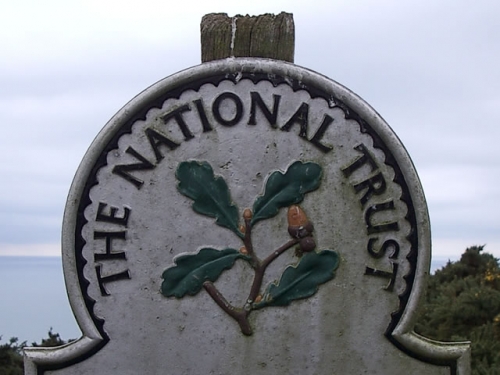 This research project conducted during 2011 is part of a portfolio of research conducted for the National Trust, the UK’s major conservation charity. The organisation is committed to the aims of widening the appeal of the properties and countryside under its management, as well as providing meaning and inspiration as part of this broad appeal. The measurement of enjoyment, linked to meaning and inspiration is therefore a critical measure in the success criteria of individual properties and the organisation as a whole.
This research project conducted during 2011 is part of a portfolio of research conducted for the National Trust, the UK’s major conservation charity. The organisation is committed to the aims of widening the appeal of the properties and countryside under its management, as well as providing meaning and inspiration as part of this broad appeal. The measurement of enjoyment, linked to meaning and inspiration is therefore a critical measure in the success criteria of individual properties and the organisation as a whole.
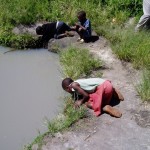 The eTourism Lab,
The eTourism Lab, 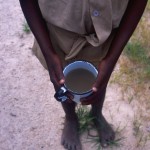 While there is agreement that charities nowadays have a greater need for marketing, there is little agreement on how they should be approaching marketing and especially when it comes to the adoption of Social Media; research has shown that they are lagging behind as they are waiting to see how others use this new technology. Today, charities of any size can take advantage of Social Media tools to showcase their organisation to the world without relying on huge budgets. Money is no longer the decision factor, creativity is. Getting a head start and expanding your Instagram presence buy choosing to
While there is agreement that charities nowadays have a greater need for marketing, there is little agreement on how they should be approaching marketing and especially when it comes to the adoption of Social Media; research has shown that they are lagging behind as they are waiting to see how others use this new technology. Today, charities of any size can take advantage of Social Media tools to showcase their organisation to the world without relying on huge budgets. Money is no longer the decision factor, creativity is. Getting a head start and expanding your Instagram presence buy choosing to 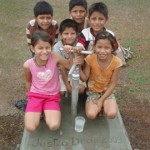 Little research has actually been carried out on marketing from a non-profitable organisation’s point of view. Bournemouth University is experimenting with Internet and Social Media to try and classify a best practice for charities to help them engage and create awareness about the problem and how people can help make a change. Facebook and Twitter are primarily used to raise awareness and create story telling. As relationships are the foundation for Social Media sites they are key for charities in order to engage further with their stakeholders. So far our attempts have been successful and we have found that followers are engaging with us through Social Media and we are now looking into ways of raising money through the various platforms to help fund new projects around the world. Using social media strategically will be critical for organisations of the future and the expertise of the eTourism Lab will be widely used for all organisations engaging.
Little research has actually been carried out on marketing from a non-profitable organisation’s point of view. Bournemouth University is experimenting with Internet and Social Media to try and classify a best practice for charities to help them engage and create awareness about the problem and how people can help make a change. Facebook and Twitter are primarily used to raise awareness and create story telling. As relationships are the foundation for Social Media sites they are key for charities in order to engage further with their stakeholders. So far our attempts have been successful and we have found that followers are engaging with us through Social Media and we are now looking into ways of raising money through the various platforms to help fund new projects around the world. Using social media strategically will be critical for organisations of the future and the expertise of the eTourism Lab will be widely used for all organisations engaging. Although a major contributor to life at BU, the study of Tourism is often wrongly maligned as being a niche subject on the periphery of more established areas of study such as Business & Management and Geography. Well, in the UK alone over 100 institutions offer HE courses at undergraduate level including “top tier” universities such as Exeter, Surrey, Strathclyde and Stirling with many more competing for students and staff across Europe and beyond with major concentrations of activity in North America, the Middle East, South East Asia and Australia and New Zealand where tourism is not only a significant area of academic interest but also of valuable income, foreign exchange earnings and employment.
Although a major contributor to life at BU, the study of Tourism is often wrongly maligned as being a niche subject on the periphery of more established areas of study such as Business & Management and Geography. Well, in the UK alone over 100 institutions offer HE courses at undergraduate level including “top tier” universities such as Exeter, Surrey, Strathclyde and Stirling with many more competing for students and staff across Europe and beyond with major concentrations of activity in North America, the Middle East, South East Asia and Australia and New Zealand where tourism is not only a significant area of academic interest but also of valuable income, foreign exchange earnings and employment. Tomorrow, Tuesday 27th September 2011, is World Tourism Day and to celebrate this week on the research blog is Tourism Week. Every day the research blog will be highlighting stories about the excellent work going on in Bournemouth University’s
Tomorrow, Tuesday 27th September 2011, is World Tourism Day and to celebrate this week on the research blog is Tourism Week. Every day the research blog will be highlighting stories about the excellent work going on in Bournemouth University’s  With many of the leading journals in the field of Tourism and related studies now recording rejection rates in excess of 90%, the pressure is on all of us with an interest in publishing in such journals to enhance our level of engagement with the variety of alternative research methodologies available to us and to deepen our level of knowledge of those deemed most appropriate; as well as to improve the level of rigour with which we apply them in our work! In addition to constructive criticism from panel members of the level of conceptual and theoretical engagement in many papers reviewed for RAE2008, feedback from reviewers points to methodological weaknesses in papers submitted and a sense of frustration over the a lack of rigour and an apparent unwillingness to try contemporary approaches.
With many of the leading journals in the field of Tourism and related studies now recording rejection rates in excess of 90%, the pressure is on all of us with an interest in publishing in such journals to enhance our level of engagement with the variety of alternative research methodologies available to us and to deepen our level of knowledge of those deemed most appropriate; as well as to improve the level of rigour with which we apply them in our work! In addition to constructive criticism from panel members of the level of conceptual and theoretical engagement in many papers reviewed for RAE2008, feedback from reviewers points to methodological weaknesses in papers submitted and a sense of frustration over the a lack of rigour and an apparent unwillingness to try contemporary approaches. 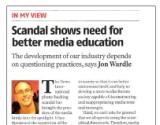 In the last few days, BU academics have achieved a series of major results by having their expertise featured in key national media outlets.
In the last few days, BU academics have achieved a series of major results by having their expertise featured in key national media outlets.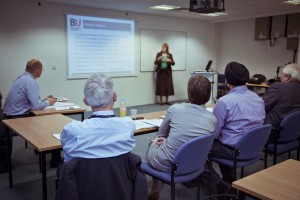 on Culinary Arts and Science
on Culinary Arts and Science
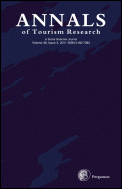
 The Annals of Tourism Research is rated a 4* journal in the
The Annals of Tourism Research is rated a 4* journal in the  Dr Richard Shipway
Dr Richard Shipway
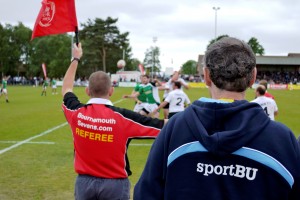 In my opinion, an active involvement with reviewing (be it on behalf of either a research council or an academic journal) is important for several reasons: firstly, it enhances our own continued professional development; secondly it provides opportunities to be associated with particular research councils or academic journals; thirdly, an active involvement is an important addition to your CV; and fourthly, reviewing can provide opportunities to view new research before anybody else and enables us to remain up to date with emerging research trends and directions. As such, if asked to review work for a research council or an academic journal, my advice to colleagues would be to acknowledge and accept the significant time commitment involved with this process, but to grasp the opportunity for the benefits it can potentially provide.
In my opinion, an active involvement with reviewing (be it on behalf of either a research council or an academic journal) is important for several reasons: firstly, it enhances our own continued professional development; secondly it provides opportunities to be associated with particular research councils or academic journals; thirdly, an active involvement is an important addition to your CV; and fourthly, reviewing can provide opportunities to view new research before anybody else and enables us to remain up to date with emerging research trends and directions. As such, if asked to review work for a research council or an academic journal, my advice to colleagues would be to acknowledge and accept the significant time commitment involved with this process, but to grasp the opportunity for the benefits it can potentially provide. The European Commission is always recruiting academic reviewers. See our
The European Commission is always recruiting academic reviewers. See our 











 From Sustainable Research to Sustainable Research Lives: Reflections from the SPROUT Network Event
From Sustainable Research to Sustainable Research Lives: Reflections from the SPROUT Network Event REF Code of Practice consultation is open!
REF Code of Practice consultation is open! BU Leads AI-Driven Work Package in EU Horizon SUSHEAS Project
BU Leads AI-Driven Work Package in EU Horizon SUSHEAS Project ECR Funding Open Call: Research Culture & Community Grant – Apply now
ECR Funding Open Call: Research Culture & Community Grant – Apply now ECR Funding Open Call: Research Culture & Community Grant – Application Deadline Friday 12 December
ECR Funding Open Call: Research Culture & Community Grant – Application Deadline Friday 12 December MSCA Postdoctoral Fellowships 2025 Call
MSCA Postdoctoral Fellowships 2025 Call ERC Advanced Grant 2025 Webinar
ERC Advanced Grant 2025 Webinar Update on UKRO services
Update on UKRO services European research project exploring use of ‘virtual twins’ to better manage metabolic associated fatty liver disease
European research project exploring use of ‘virtual twins’ to better manage metabolic associated fatty liver disease